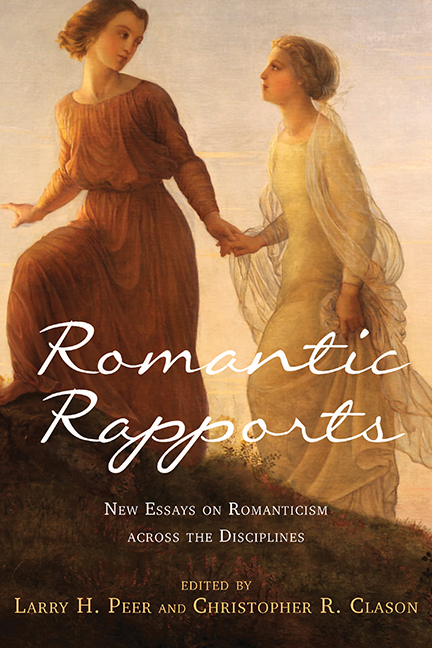Book contents
- Frontmatter
- Dedication
- Contents
- Acknowledgments
- Introduction: The Polyvalence of Romanticism
- Part I Romanticism and the Literatures
- Part II Romanticism, Music, and the Visual Arts
- Part III Romanticism and Science, Technology, Philosophy
- 7 A Romantic Scientist in Percy Shelley's Alastor
- 8 Canines and Other Quadrupeds: Human and Animal Relations Staged in Romantic Drama
- 9 Goethe and Individuation
- Notes on the Contributors
- Index
9 - Goethe and Individuation
from Part III - Romanticism and Science, Technology, Philosophy
Published online by Cambridge University Press: 30 August 2017
- Frontmatter
- Dedication
- Contents
- Acknowledgments
- Introduction: The Polyvalence of Romanticism
- Part I Romanticism and the Literatures
- Part II Romanticism, Music, and the Visual Arts
- Part III Romanticism and Science, Technology, Philosophy
- 7 A Romantic Scientist in Percy Shelley's Alastor
- 8 Canines and Other Quadrupeds: Human and Animal Relations Staged in Romantic Drama
- 9 Goethe and Individuation
- Notes on the Contributors
- Index
Summary
AMONG ROMANTICISM's BASIC TENETS is radical individualism. It occurs everywhere in the arts and even across the disciplines, sometimes tending toward self-idolatry (Schenk, 125–51), at other times taking the form of a valorization of natural genius (Abrams, 187–97), and often serving as the movement's most characteristic intellectual or structural idea (Morse, 1–2). Goethe's particular theory of individualism represents a highly sophisticated and complex view of the matter. “He said, famously, ‘Individuum est ineffabile’ (individualism is ineffable).” Manfred Frank, who likes this quote, draws a distinction between individuals and particulars. In Frank's usage, a particular is always an instantiation of “ein Allgemeines”—a general. The features and actions of an individual, by contrast, cannot be inferred from the category to which it belongs. “Individuality is a particular that cannot be derived without discontinuity from a general.” “An element that can be separated from a whole by the imposition of limits (or one that is subsumed under a rule as a case) is called a particular.” A particular, which represents the “esse commune,” is a species, albeit the smallest species, whereas an individual is incommensurable and capable of surprising. Particulars are specimens of their class or genus, whereas individuals produce and express novelty. It would be a dull world that had only classes and particulars, but no individuals.
Every unique thing is ineffable, for to express the essence of any being we would have to cite attributes that it has in common with other essences. But individuals, unlike particulars, alter the systems of relations in which they reside or with which they intersect, thus creating ever-shifting and novel rapport. All persons are individuals, but some express their individuality in more dramatic ways than do others. The young Goethe displayed his admiration for the rugged individualist “Kraftkerl” in his early Sturm und Drang dramas, and expressed his own personal individuality in creating original verse forms and in the mildly outrageous conduct of his early Weimar years. He takes his individualism so far as to reject exclusivity in romantic relationships and to suggest in the play Stella that a unique, untransferable love for one individual does not preclude a simultaneous, equally untransferable love for a different person.
- Type
- Chapter
- Information
- Romantic RapportsNew Essays on Romanticism across the Disciplines, pp. 159 - 172Publisher: Boydell & BrewerPrint publication year: 2017



